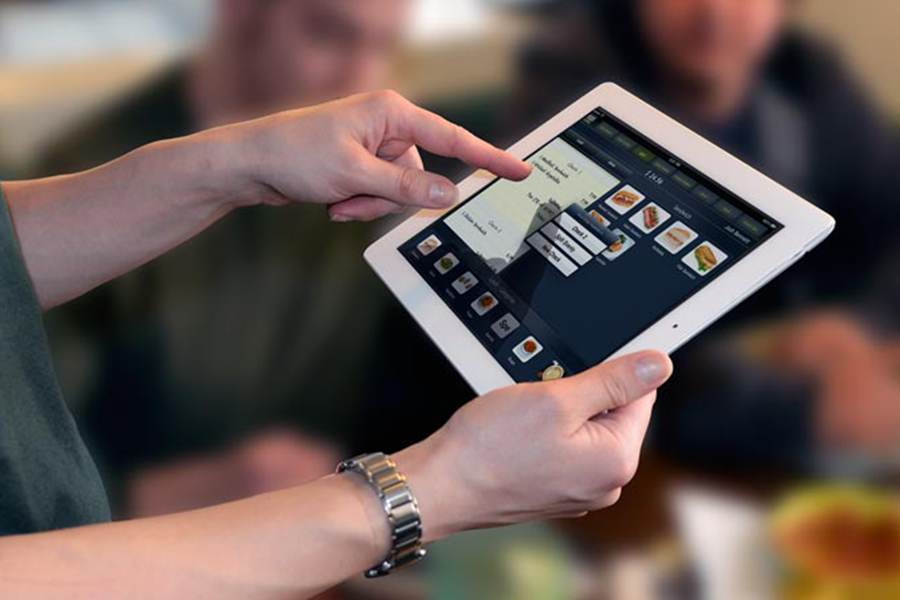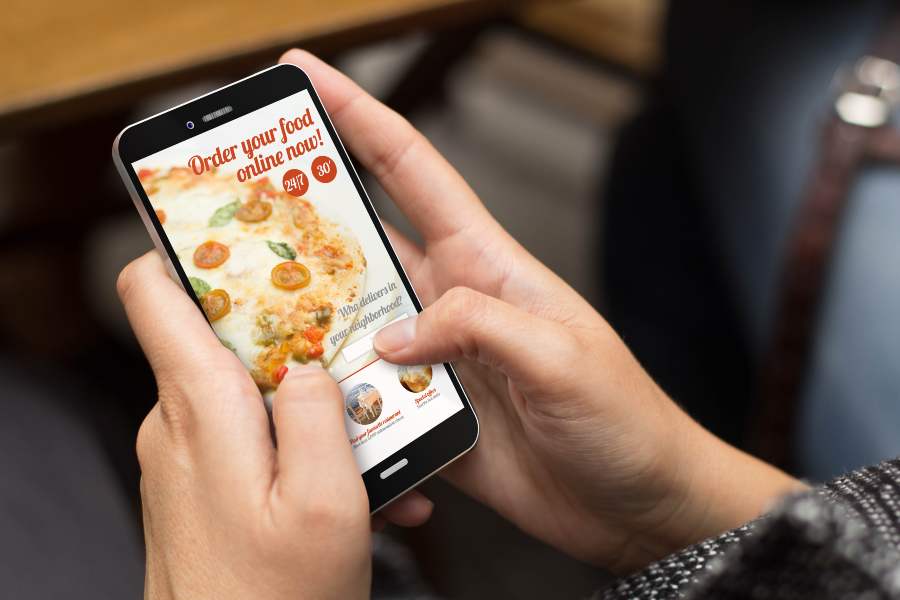The best restaurant scheduling software and apps make it easy to create consistent schedules, alert employees about their shifts and news, and allow shift swapping. They also prepare payroll and sync with restaurant point-of-sale (POS) systems for labor forecasting. After evaluating 19 popular platforms, we chose the six best restaurant scheduling software for 2024.
The best six restaurant scheduling software apps for small businesses are as follows:
- Homebase: Best overall restaurant scheduling software
- 7shifts: Best for restaurants with multiple locations
- Sling: Best for food trucks and small restaurants
- Deputy: Best for restaurants with surge months that need extra workers
- SocialSchedules: Best for restaurants serving alcohol, like pubs
- When I Work: Best for catering and special events
New to employee scheduling? Read our guides to learn the basics.
Restaurant Scheduling Software & Apps Compared
Provider | Our Score (out of 5) | Free Plan | Starting Monthly Price | Autoscheduling |
|---|---|---|---|---|
4.79 | ✓; limited to 1 location and up to 20 employees | ✓ | ||
4.69 | ✓; limited to 1 location and up to 30 employees | Highest plan only | ||
4.51 | ✓; includes up to 50 employees | $2 per user | Highest plan only | |
4.33 | ✓; includes shifts only; 31-day free trial | Standalone scheduling tier and higher plans | ||
4.28 | ✓; limited to 10 users and one department per location | $15.99 per location | ✕ | |
4.24 | No free plan; 14-day free trial | ✓ | ||
Homebase: Best Overall Restaurant Scheduling Software & App

Pros
- Intuitive interface
- Unlimited number of employees per paid plan
- Time clocks included in the Free plan
- Good customer support
Cons
- Free version only for one location with up to 20 employees
- Some complaints of login issues with mobile
- Time off tracking in higher plans only
- May take some time to learn
Overview
Who should use it:
Homebase is our top-recommended employee scheduling software and ranks No. 1 for employee scheduling software for small businesses. The free version, good for one location and up to 20 employees, makes it especially useful for small restaurants. The paid plans can take scheduling to the next level, and depending on how much you want to pay per location, you can get everything from forecasting to PTO management to HR compliance support.
Why we like it:
On this rubric, Homebase earned 4.79 out of 5, with perfect scores for pricing, scheduling tools, and reporting. It’s our top pick because of its robust scheduling tools that include templates and suggested shifts, automated team tracking, scheduling building, time off, and shift changes. Plus, it helps eliminate no-shows by automatically reminding employees of their shifts.
It lost some points because it has chat rather than phone support, and there are some complaints about the app glitching (this was normal for almost all the apps, especially after updates).
- Basic (Free): One location, up to 20 employees, scheduling, time clocks, messaging
- Essentials ($24.95/month/location): Free plan plus team communication, shift performance tracking, remote tools
- Plus ($59.95/month/location): Essentials plan plus labor costing, time off limits, PTO tracking, permissions, hiring tools
- All in One ($99.95/month/location): Plus plan that also includes onboarding, employee documents, HR, compliance
*Payroll add-on ($39/month + $6 per user/month): Includes tax filings, employee onboarding, and unlimited payroll runs. This price is competitive with other dedicated payroll software, and there’s no worry about integration issues.
- Free version: Homebase has the most complete free plan on our list, with a schedule builder, shift trade capability, and templates. It allows employee messaging and end-of-shift feedback. You can offer pay advances, too.
- Forecasting tools: While Deputy has strong labor forecasting tools, Homebase gives it a run for its money. With its Budget Forecasting Toolbar, you can view weather and sales forecasts alongside weekly shifts. This allows you to create schedules that are in line with sales and labor targets.
- Scheduling: The paid plans include automated scheduling, plus rules for breaks and overtime already set for your state. You can add notes, set geofencing (a nice tool for caterers), and announce open shifts. Some applications, like 7shifts, let managers clock out for employees that forget, but Homebase (and Sling) can do it automatically.
- Restaurant features: The by-location pricing is great for restaurants that have high and low seasons, such as those in tourist areas. Homebase integrates with popular POS software for clock-ins, Restaurant 365 for accounting, and BevSpot for beverage management. You can also assign multiple roles and wage rates, a handy tool if you have a waiter who sometimes bartends.
- Hiring tools: Homebase stands out for its job posting and applicant tracking tools, making it a solid choice for restaurants with a high employee turnover. You can post to job boards, manage referrals and walk-ins, set up screener questions, and schedule interviews. Once hired, it has onboarding tools. 7shifts also has hiring tools.
- HR and payroll functions or integrations: You can get access to advisers, document storage, an employee handbook builder, and more. It also offers strong tools for compliances, such as tracking certifications, breaks, and overtime. It even notifies you if labor laws in your state change—another way it sets itself above the competition. Homebase offers performance management tools, while the top plans include labor costing.
- Mobile app: Despite a slightly higher learning curve, Homebase gets high marks from users for the desktop and mobile versions. The mobile app earned 4.8 out of 5 on iOS and 4.4 out of 5 on Android—high scores for this group.
- Ease of use: Customer service is live via chat or email, and there are help guides and video tutorials.

Homebase has alerts built in place to notify of scheduling conflicts. (Source: Homebase)
Real-world user reviews over multiple third-party sites rated Homebase high, giving it favorable reviews for monitoring timesheets and coordinating schedules. They also liked the onboarding payroll features and how easy the platform was to use, and they considered it the best software for restaurants and bars.
Some complaints include the limited number of roles users can access, having to sign into the desktop version for some management features, and the geofencing feature can be glitchy at times.
- G2: 4.2 out of 5 stars; 100-plus reviews
- Capterra: 4.6 out of 5 stars; 1,000-plus reviews
- TrustRadius: 6.9 out of 10 stars; 20-plus reviews
7shifts: Best Restaurant Employee Scheduling Software for Multiple Locations & Franchises
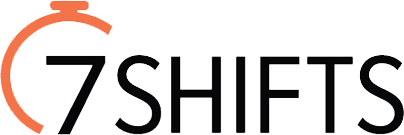
Pros
- User-friendly
- Compliance and overtime rules
- POS integrations
- Machine learning auto-scheduler tool available (Gourmet Plan only)
Cons
- Limits on employees per plan
- Many features available only in higher plans
- Autoscheduling only with highest plan
- Free plan limited to 30 people at one location
Overview
Who should use it:
7shifts is designed specifically for restaurants, with strong restaurant tools like tip pooling, a highly rated mobile app, and integration with dozens of POS systems. It offers discounts to franchises and restaurants with multiple locations, and it’s an extremely popular choice for restaurants with one location.
Why we like it:
With a score of 4.69 out of 5 on our rubric, 7shifts is a close second to Homebase. It, too, had a perfect score for pricing and excellent scores in every other section. It offers a free plan for one location and up to 30 employees, plus it has excellent scheduling features. Staff can swap shifts, it integrates with popular payroll solutions, and it offers time clocking, tip management, and team engagement tools.
Its mobile app is among the highest rated, helping you build schedules quickly on the go. And real-world users give the software high marks. It lost points primarily because many of the features we looked for were in the higher-priced plans.
Like Homebase, 7shifts charges per location, but it limits the number of employees in the Comp and Entree plans. The prices are higher than Homebase, but it offers an excellent set of tools for each and the option for add-ons.
- Comp (Free): Single location, up to 30 employees, scheduling, time off, time clock, team chat, hiring tools, employee engagement tracking, employee health checks, and live support for 60 days
- Entrée ($34.99/location/month): Comp plan plus unlimited scheduling templates, shift notes, labor budgeting. Break and tips tracking, wage-based roles, time card sync with POS, PTO requests, SMA notifications, read receipts, API access, and unlimited live support
- The Works ($76.99/location/month): Entrée plan plus unlimited employees, weather, stations and advanced budgeting, optimal labor tool, department-based budgeting, geofencing, advanced time clock and compliance tools, overtime/break/punch alerts, state-based compliance tools, payroll integration, manager log book, shift feedback, and labor expectation reporting
- Gourmet ($150/location/month): The Works plan plus operations overview, machine learning auto-scheduler, non-cloud POS integration, task management, operations overview reports, dedicated account management, and implementation services
It also offers a handy a la carte menu of extras (paid per month, per location) in case you want a plan with a specific tool (not available for the Comp plan).
- Payroll ($39.99 per month per location + $6 per employee paid): Sync timesheets, tips, and PTO straight to payroll.
- Operations overview ($6.99): Track labor performance and engagement across all locations
- Task management ($12.99): Daily checklist management
- Tip Pooling ($24.99): Create, calculate, and track tip pools
- Manager Log Book ($14.99): Customizable digital log book
- Tip Payouts ($49.99 + 75 cents per transaction): Instantly pays dips to employee debit accounts
- Employee Onboarding ($2.99 per onboarding package sent): Securely send, collect, and store onboarding packages for new hires
- Multilocation tools: Several of the software on our list let you manage multiple locations. 7shifts stands out in letting you work with its schedules together or individually as needed. You can connect all the locations and switch between them, both on mobile and desktop. With the Operations add-on, you can compare multiple locations’ sales, labor, and employee engagement data.
- Made for restaurants: Of all the scheduling software we considered, 7shifts alone was made specifically with restaurants in mind. It integrates with about two dozen POS systems, most of which are focused on the restaurant industry, as well as with ExpandShare, a restaurant training solution, and HigherMe, a hiring app for restaurants and retailers. It also has a tip reporting feature, including a tip pooling function.
- Machine-learning autoscheduling tools: While autoscheduling is only with the Gourmet Plan (where others, like Homebase, have it in cheaper plans), it is machine-learning based. The time clock stands out not only in that it can integrate with your POS, but also in that it records clock-ins/outs when the Wi-Fi is down and syncs later. Only Homebase, SocialSchedules, and Deputy also have this capability.
- Text and in-app employee communications: Employees can trade shifts, request time off, and change availability all on the app, with manager approval and schedule updating. Announcements can be sent by text and email as well. Like with Deputy, you can upload videos, such as for training, and 7shifts has a reader-receipt so you know which employees saw the message.
- Highly rated mobile app: This app earned 4.7 out of 5 with around 1,900 reviews for iOS and 4.5 out of 5 with about 6,800 votes for Android. However, as with the last time we reviewed, updates have resulted in glitches and complaints.
- Large number of HR, POS, and payroll integrations: 7shifts connects with more than a dozen payroll systems like QuickBooks, Gusto, and ADP, flagging missed or late shifts to ensure payroll accuracy. It also integrates with 25-plus POS software.
- Manager logbooks and surveys: The manager logbook, something only a few applications like SocialSchedules have, makes it easy to identify opportunities or problems and communicate between shifts. One standout is the end-of-shift feedback survey to make sure you identify problems before they boil over. It recently added task reminders as well, something we didn’t see with other
- Ease of use: Support is mainly by ticket, but the support section lists a phone number. You will find video and illustrated how-to articles, plus templates and guides.

7shifts offers various scheduling templates and drag-and-drop shift swapping features. (Source: 7shifts)
Popular review sites show that users like 7shifts, with above-average scores. Users like the ability to create and manage teams across multiple locations, integrations with other platforms, and customizable alerts.
7shifts is one of the top user-rated scheduling software applications on our list. Employees and managers loved the interface and said it was easy to use and that the support team was great.
Complaints include glitchiness in the app at times and the lack of an auto-save feature.
- G2: 4.5 out of 5 stars; 100-plus reviews
- Capterra: 4.7 out of 5 stars; 1,100-plus reviews
- TrustRadius: 9.3 out of 10 stars; 10-plus reviews
Sling: Best Restaurant Employee Scheduling Software for Food Trucks & Small Restaurants

Pros
- Free plan
- Easy to use
- Unlimited locations and employees per plan
- Labor costing and forecasting in all paid plans
Cons
- Autoscheduling in the highest plan only
- Time clock not included in the Free version
- Shift-swap not allowed in the Free version
Overview
Who should use it:
Sling is one of the cheapest restaurant employee scheduling services we reviewed, and it does not have a monthly minimum. Even though it’s used by Subway, KFC, and Taco Bell, we like it for small restaurants and food trucks because of the price point. The unavailability rules make it great if you hire minors and for blocking out leave times, and it has strong communication tools as well.
Why we like it:
In our evaluation, it earned an overall score of 4.51 out of 5. It earned a perfect score on pricing, with inexpensive monthly plans even at the business level, and a perfect score for scheduling tools and reporting.
Like 7shifts, Sling offers drag-and-drop scheduling to help create employee schedules faster. It also allows you to create work schedule templates, employee shift swapping, notifications for updated schedules, and employee availability tools.
It lost points for lacking live phone support and an offline mode.
Sling is the least expensive on our list in terms of per-person fees because it does not have a by-location price. Thus, if you have more than 13 people in one location, Homebase will be cheaper.
- Free: Includes up to 50 users, plus shift templates, schedules, and alarms; shift availability; time off requests; news sharing; mobile (but not mobile clock-in); and unlimited everything
- Premium ($2/user/month): Free plan plus mobile time clock, timesheets, early clock-in prevention, shift swaps, unavailability tagging, group messaging, budgeting, labor cost management, clopening prevention, overtime tracking, and Google calendar sync
- Business ($4/user/month): Premium plan plus auto-assigning, kiosk time clock, reports, salary support, no-shows, late arrivals, task management, PTO management, labor/sales/payroll reports, and employee document storage
- Task creation and templates: Openings, closings, deep cleans, and inspection preps all work better when the staff knows exactly what to do. Sling offers a robust tasking function that lets you assign tasks to individuals or teams, create and save task templates for recurring duties, and provide manager feedback. Homebase, by contrast, lets you add notes to the schedule but does not have task lists, per se.
- Unavailability, autoscheduling, and more: We especially like how Sling tracks unavailability and time off because you can use it for compliance as well—for example, create unavailability rules for minor workers. The Business plan includes autoscheduling based on availability and qualifications. The time clock lets you set limits on when early employees can clock in and, like Homebase, will automatically clock them out at the end of the shift.
- Basic employee communications: In addition to task lists, Sling (like the others on our list) offers both messaging and an interactive news feed, so you can keep your employees up to date on policies or events. Employees can use the app to request shift swaps and get reminders about shifts and clocking in.
- Handle multiple positions, compliances, and more: Sometimes, employees may hold more than one position—waiter and bartender, for example. Many apps will let you apply different wages, but Sling also alerts you if you try to schedule someone for a job when they are already working a different one. In addition, you’ll find tools to help you stay compliant with labor laws for minors, monitor overtime, and set up tasks for common restaurant chores.
- Integrations: It’s easy to tackle payroll by approving timesheets on desktop or mobile and exporting them to your payroll processor or as an XLS or CSV. Sling also offers budgeting and holiday pay rules. Sling connects to POS systems like Toast, Square, and Restaurant Manager, and it recently added Gusto Payroll.
- Mobile app: Like others on our list, Sling has a mobile app that allows you to schedule and approve on the go. Employees can also view their schedules and be informed of availability. It earned 4.6 out of 5 on iOS and 4.6 out of 5 on Android, both with over 1,000 reviews.
- Ease of use: There are video tutorials and illustrated how-to articles, but support is limited. Sling doesn’t currently support phone calls; however, you can open a chat inquiry (replies within a few hours) or contact Sling by email.
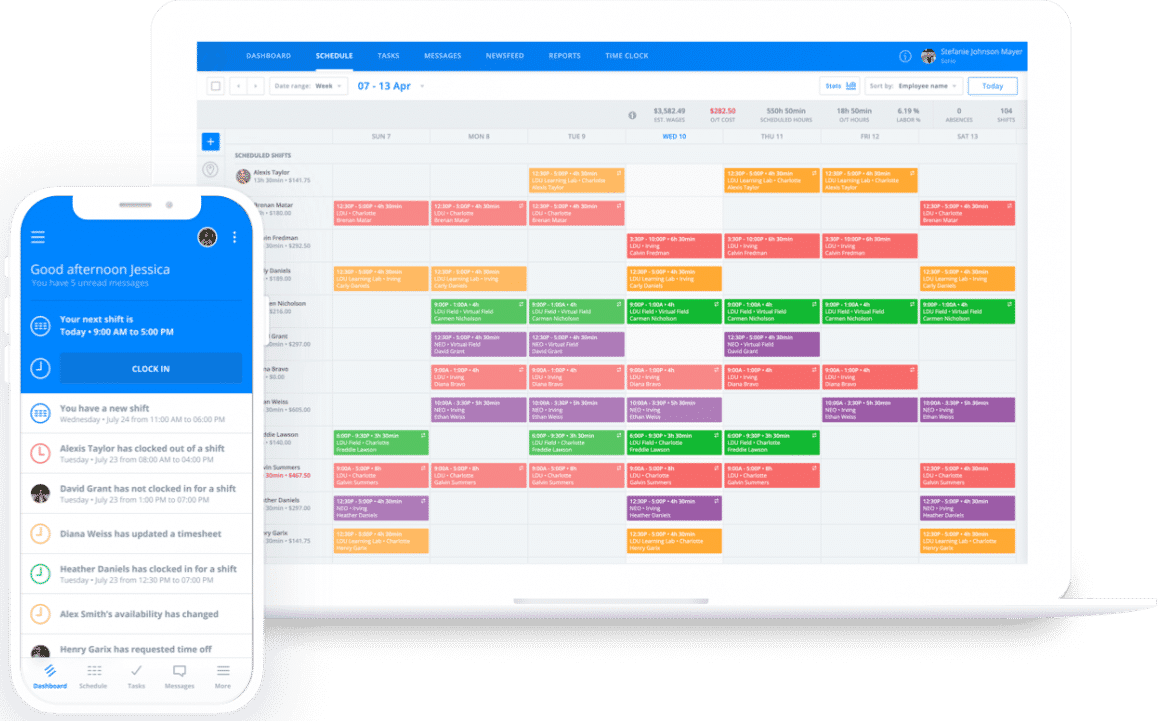
Sling’s mobile app makes it easy to set up and approve schedules. (Source: Sling)
Users rated Sling favorably, citing instant shift updates, low cost, and a simple mobile app. They also liked repeating shifts, the easy-to-use style and format, and how easy it is for both managers and employees.
While Sling didn’t receive as many user reviews as most of the software on our list, it did generate good scores across multiple third-party review sites. Managers enjoyed the ease of use and said the free plan gave them everything they needed. Employees also thought it was easy and appreciated the reminders.
Complaints included that features were sometimes hard to locate, lack of efficient customer support, and limited integrations.
- G2: 4.4 out of 5 stars; 80-plus reviews
- Capterra: 4.6 out of 5 stars; 160-plus reviews
- TrustRadius: 8.6 out of 10 stars; 10-plus reviews
Deputy: Best Restaurant Employee Software App for Seasonal Restaurants

Pros
- Good customer service
- Strong forecasting tools
- Strong mobile app
- Available internationally
Cons
- Limited free plan; scheduling not included
- Integration problems reported by customers
- Forecasting only in the Enterprise plan
Overview
Who should use it:
Deputy’s Flexi Plan is a great asset for caterers or restaurants that have regular high and low seasons, as it lets you keep inactive employees in the system without paying full price. Others on our list let you archive inactive employees, but not keep them in newsfeeds or let them make time-off requests.
Deputy is also good for restaurants and bars with delivery service and bartenders on staff, as it allows you to forecast how many staff members you’ll need in each department and schedule available staff in a matter of minutes.
Why we like it:
The platform, which is available in over 90 countries, with 24/7 support for each region, earned a score of 4.33 out of 5 in our evaluation and is also in our evaluation of the best employee scheduling software for its excellence in handling multiple locations and roles.
We like Deputy because it helps you build schedules in minutes and share them instantly with your staff. It offers real-time data on wages and sales so that you can keep costs low, and it uses AI technology to autoschedule, helping you fill empty shifts automatically.
It took a hit in our scores primarily because its time and attendance tool costs extra, and it lacks live phone support. The forecasting tools, which we found impressive, are only in the Enterprise Plan. If this is a deal-breaker for you, consider Homebase.
Deputy comes with a free 31-day trial. It has discounts for charities, nonprofits, and community organizations that meet their criteria, making it a good choice for soup kitchens or church- or charity-run coffee houses.
- Starter (Free): Includes 100 shifts per month, PTO and leave management, and 24/7 email support
- Premium ($6/user/month): Scheduling and Time & Attendance plans, plus reporting; includes Starter plan, plus unlimited shifts, unlimited timesheets, employee scheduling, autoscheduling, payroll integration, POS integration, PTO and leave management, and tasking
- Enterprise (Custom): Premium plan plus advanced demand planning and analytics, training, location procedures, custom implementation, dedicated enterprise support, training, and certification management
You can also purchase standalone products as needed:
- Scheduling only ($4.50/user/month): includes unlimited shifts, autoscheduling, PTO management, newsfeed, tasking, POS integration, 24/7 email support
- Time and Attendance only ($4.50/user/month): Unlimited time sheets, payroll integration, POS integration, PTO management, newsfeed tasking, 24/7 email support
- Flexi ($2.50/active employee/week, 50 cents/inactive employee/week): Same features as Premium; best if <50% of employees are active at a time
- Flexi Plan: Designed for seasonal businesses or caterers, the Flexi Plan handles highly fluctuating staff. Rather than archive or drop employees not working that week, you put them on inactive status. They can still receive communications (and training), submit leave requests, and update their profile. This way, when you need all hands on deck, your trained workers are a click away. No other scheduler on our list has this type of plan.
- Forecasting and rules-based scheduling: Deputy’s Enterprise Plan lets you predict staffing needs based on trends in sales, deliveries, appointments/reservations, and other signals you can set. Create rules based on its analysis to ensure you have the minimum staffing, plus get alerted if you may be scheduling too many people. You can apply the forecasting tools when automatically creating a schedule; most software just gives you an analysis.
- Complete scheduling tools in all plans: Deputy includes drag-and-drop shifts and compliance rules like break times, work hour restrictions for minors, time off, overtime, shift-swapping, and autoscheduling in the basic plan. Time and attendance includes geofencing, creates timesheets for you to approve, and syncs with your payroll software. Also, managers can see who’s on shift, on break, and running late.
- Mobile app: Deputy tied with When I Work for the best mobile employee scheduling app, with 4.7 out of 5 with about 2,800 reviews for iOS and 4.7 out of 5 with around 16,000 votes for Android. The praise was overall good and the complaints were few and varied.
- Clopening prevention and other restaurant features: Deputy has robust tools in all its plans. It alerts you if you accidentally schedule a “clopening”—where the same person closes one night and opens the next. It does shift analysis so you can see if you’ve overstaffed. Like 7shifts, it can record video announcements to post on the newsfeed and set up health screening for employees.
- Compliance tools and integrations: Like SocialSchedules, Deputy helps businesses in Fair Work Week jurisdictions stay compliant by recording schedule amendments, calculating the required predictability pay, and capturing employee consents to change. With roughly 40 integrations, Deputy is one of the best for connecting to popular POS or payroll systems.
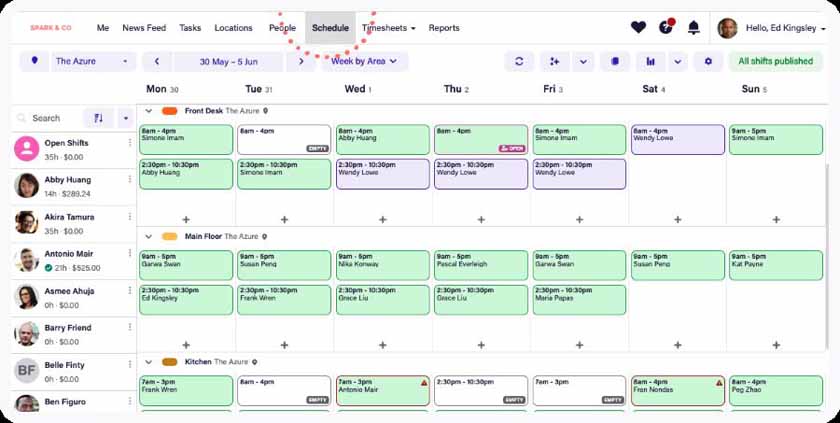
With Deputy’s scheduling tab, you are able to sort by employee to see all created schedules. (Source: Deputy)
Users give Deputy high praise for its ease of use, and top-notch tools. They like its user-friendly interface and flexibility with real-time updates. Users also appreciate its time tracking tools included in its scheduling plan. They also highlighted the product’s usefulness in streamlining communication and enhancing collaboration within teams.
Complaints include a sometimes glitchy mobile app and difficulty with canceling and verifying PTO leaves.
- G2: 4.6 out of 5 stars; 300-plus reviews
- Capterra: 4.6 out of 5 stars; 700-plus reviews
- TrustRadius: 8.4 out of 10 stars; 450-plus reviews
SocialSchedules: Best for Strong Compliance Tools
Pros
- Strong labor law compliance tools
- Mobile scheduling
- Free version
- Manager logbooks included in paid plans
Cons
- Free plan limited to 1 location, 10 people, cloud storage for 28 days
- Glitches in mobile app
- No time clock in the Starter plan
Overview
Who should use it:
SocialSchedules is a scheduling and time clock software with strong compliance tools to augment its excellent scheduling and communications features. We recommend it for businesses concerned with specific labor laws and required certifications, such as bars, pubs, and restaurants serving alcohol.
Why we like it:
It earned 4.28 out of 5 on our rubric. It earned excellent scores for pricing and ease of use. We like it for its robust labor law compliance features that simplify scheduling and rest break planning, as well as time tracking. Plus, it allocates paid/unpaid breaks automatically based on actual worked hours, applies penalties for missed meal breaks, and stops the send-outs of planned schedules if it has compliance breaches.
However, it took a large hit because you cannot create custom reports, and its sales forecasting tools are only available if you integrate with a compatible POS system.
SocialSchedules has a limited free plan. It’s not as good as Homebase’s, but if your needs are basic, it may work. However, its by-location prices are cheaper than Homebase and 7shifts. It also has a free 14-day trial.
- Basic (Free): Mobile app, scheduling, messaging, availability and PTO management, 10 workers, one location, 28 days’ cloud storage for reports, and minimal compliance tools (max days/hours, public holidays)
- Starter ($15.99/month/location): Basic plan plus unlimited workers, two departments per location, one year’s cloud storage, multiple locations management, blackout days, department budget, overtime tracking, and manager logbooks
- Premium ($39.99/month/location): Starter plan for unlimited workers, five departments, and five years’ cloud storage, plus time and attendance, POS/payroll integration, labor law compliance, certification management, advanced reports, sales forecasting, break notifications, time clock with clock-out questions and notifications, and time card approvals
- Enterprise (Custom): Premium plan with unlimited workers and departments per location, seven years’ cloud storage, designated support contact, custom API, custom reports, custom features, and AI-generated sales forecasting
- Compliance rules, certifications, and tracking: Like others, SocialSchedules lets you set pay rates, limit hours, and check for compliance breaches like overscheduling a person. However, it also can track certifications and alert you when an employee’s certificate is about to expire. In addition, you can create disclaimers for employees to read upon clocking out and get acknowledgement of changes in schedules or policies, which can help with Fair Work Week compliance.
- Custom availability settings for scheduling: SocialSchedules has schedules and templates but stands out from the rest with its custom availability feature. Employees can create multiple availability sets with their own start and stop dates. Plus, managers can lock days where workers cannot drop or trade a shift on that day. (Homebase has this feature too.)
- Logbooks and other employee communications: As with most restaurant scheduling software, you can alert employees to the new schedule, send private and group messages, make announcements, and send reminders. Workers can trade shifts, or managers can invite an employee to take on a shift. Like with Homebase and 7shifts, managers also have the advantage of a logbook for tracking receipts, sharing images (like of the refrigerator that didn’t get cleaned during closing), and loading documents.
- Tips reporting, restaurant software integrations, and other restaurant features: Like 7shifts, SocialSchedules has a tips reporting function as part of the time clock. It integrates with several restaurant POS systems, such as Heartland Restaurant, POSitouch, Restaurant Manager, and Square. You can tag shifts so waiters know where they are working and send addresses with maps for people who are delivering to or catering an event.
- Compliance-centric HR and payroll functions: The bulk of the HR functions lie in its compliances and certification management. Managers are quickly informed of issues like clocking in early from a break. You can run reports needed to see how your staff is performing, and if you have POS software, you can pull in sales information, create labor vs sales reports, import time cards to payroll, and more.
- Ease of use: The Enterprise plan includes dedicated live support, and there are set-up services available.
Users like SocialSchedules because of the interoffice communication between hourly employees, how easy the software is to navigate, and the functionality of the features. However, most reviews are for OpenSimSim before it became SocialSchedules.
Complaints include glitchy software and the inability to flag certain required labor practices, like meal breaks in California. They also complain about having to manually edit availability for workers.
- G2: 4.6 out of 5 stars; 15 reviews
- Capterra: 4.5 out of 5 stars; 550-plus reviews
- TrustRadius: not enough reviews to rank
When I Work: Best Restaurant Shift App for Catering & Special Events

Pros
- Ability to create custom reports
- Autoscheduling in all plans
- Intuitive interface and highly rated mobile app
- On-demand pay option
Cons
- Basic standard reports
- Extra fees to get access to overtime alerts, POS and payroll software integrations, and mobile time clock apps with GPS enforcement
- No free plan
- No live phone support
Overview
Who should use it:
When I Work is a highly popular scheduling software with a terrific mobile app that has excellent tools for catering and special events businesses that may have fill-in workers. It’s among the most reasonably priced if you only need powerful scheduling—and its Time & Attendance module includes on-demand pay via Clair Debit Mastercard, which makes it great for paying restaurant employees instantly.
Why we like it:
When I Work earned a score of 4.24 out of 5. It lets you create custom reports, earning it a perfect score in reporting, but lost points for not having a free plan (although it does have a free trial), lacking live support, and charging extra for its time clock tool.
The platform allows you to manage your team, control labor costs, and reduce absenteeism. It offers time and attendance and a time clock solution to help keep track of your employees’ hours. Plus, it offers a wide range of reporting, from shift reports to time reports to attendance and labor cost reports.
Since When I Work doesn’t have a traditional free plan, if you are more budget conscious, consider Deputy or Sling, which both offer free plans without as many limitations as others on our list.
When I Work offers three plans—Essentials, Pro, and Premium—with the option of adding the Time & Attendance Module. The prices are per user and compete well, although if you only have one location, it might be cheaper to use Homebase. All plans come with unlimited users and three administrators. It also has a 14-day free trial with all the features.
- Essentials ($1.50 per user per month): Team messaging and management, availability management, document storage, SMS push notifications, autoscheduling, multiple locations, labor planning, shift tags, task lists, shift swapping, and shift notifications.
- Essentials w/Time & Attendance ($3 per user per month): Adds time clock, overtime alerts, break management, GPS enforcement, early clock-in prevention, photo clock-in, labor distribution reports, POS and Payroll integrations, on-demand pay by Clair
- Pro ($3 per user per month): Essentials plan plus advanced scheduling rules, custom reports, labor sharing
- Pro w/Time & Attendance ($5 per user per month): Essentials with Standard Time & Attendance plus custom attendance reports.
- Premium ($5 per user per month): Pro plan plus API key access, web hooks, single sign-on,
- Premium w/Time & Attendance ($7 per user per month): Pro with Standard Time & Attendance with enhanced customization
- Forecasting and autoscheduling in all plans: When I Work stands out in that its forecasting and autoscheduling tools are on all plans, whereas others have them in higher-paid plans. Further, it not only lets you manage multiple location schedules but has a labor-sharing tool that lets you look at eligible and available employees from other schedules. The budgeting tool is right on the schedule, so you can be sure you don’t overstaff for the week.
- GPS shift tools: Like SocialSchedules, you can add GPS details to shifts so that employees know where to report, making it a good choice for catering or where employees may work in several locations. The time clock has tracking so you can see when employees are at their location.
- Best mobile app: When I Work ties with Deputy for the highest-rated mobile app on our list: 4.8 out of 5 on iOS with 37,000-plus votes and 4.7 out of 5 on Android with 66,000-plus votes. There was only one written review for 2023 (Android) and one for 2022 (iOS), but both praised the app for ease of use.
- Read receipts, SMS, and in-app communications: One standout for When I Work is that managers can see who has looked at the schedule. It also stands out in that all plans include SMS text notifications; most rely on in-app chat, which employees may or may not access regularly. You can create task lists for the shifts to ensure all work gets done.
- On-Demand Pay by Clair: With the Time & Attendance module, you also get on-demand pay. Employees get a Clair Debit Mastercard, and they can use it to get instant access to their earnings, plus set up spending and savings accounts. The Clair card includes fee-free cash withdrawals at qualifying ATMs. No other employee scheduling app has this, and it’s a great tool for part-time employees or fill-ins.
- Ease of Use: When I Work is a cloud-based software that is easy to set up and has a user-friendly interface. Although it doesn’t offer live phone support, you can fill out a ticket online or speak with customer service via live chat.
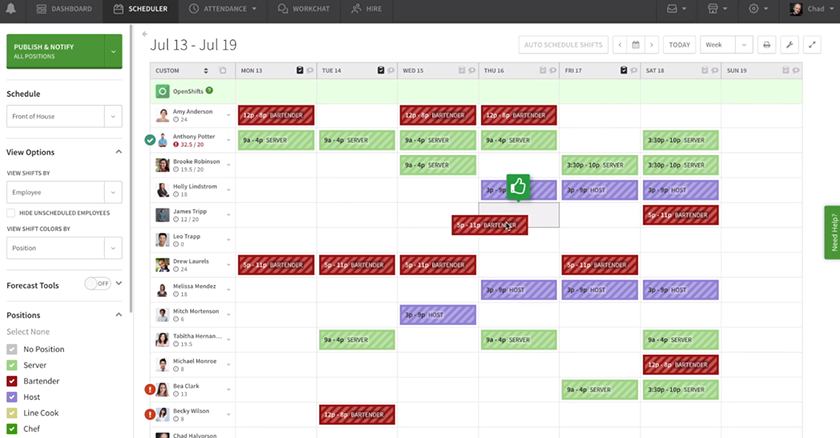
When I Work lets you drag and drop shifts for quick schedule changes. (Source: When I Work)
When I Work users like how simple it is to add and remove employees, review timesheets, and organize schedules. They also claim it has a better interface than its competitors. Users appreciate the ability to set availability and request time off right from the app.
Complaints include the inability to designate specific managers for notifications, the lack of smart forecasting, and repeating shifts that can appear clunky.
- G2: 4.3 out of 5 stars; 250-plus reviews
- Capterra: 4.5 out of 5 stars; 1,100-plus reviews
- TrustRadius: 8.9 out of 10 stars; 60-plus reviews
How to Choose the Best Restaurant Scheduling Software
When deciding on the best scheduling software for your restaurant, there are a few things to consider:
- How many locations and employees do you have? Some schedulers charge by location with up to 30 or more users per plan. Others charge by the user. As a result, one type may be cheaper. Also, look for minimum limits.
- What kind of restaurant do you run? For example, a restaurant with a bar may have different scheduling needs than a fast-food restaurant—one may need multiple schedules for specific areas, while the other should have stronger warnings in place to ensure minors are not overscheduled.
- What features do you need? Schedulers usually offer templates, shift swapping, and basic compliance tools. From there, they vary, with automations, HR tools (even hiring and onboarding), and communications.
- How important is mobile? If your employees will be checking schedules and making shift requests via mobile, then be sure to look at the ratings and reviews of the mobile apps. Also, we suggest that they be free restaurant scheduling apps; some schedulers charge extra for their mobile application, which seems unfair to employees.
- Do you need time tracking? Most scheduling software includes time tracking, although some have it in their higher plans. If you already have a time tracker, be sure it integrates with your schedule app for maximum efficiency.
- Do you want payroll? Some schedulers offer time cards for integration into payroll—some even offer payroll services. Several let your employees request PTO, which when approved, is noted by the software so you don’t schedule someone on their time off.
- What software do you need to integrate with? Scheduling software integrated with your time trackers, POS system, payroll, or HR tools can make your job easier and prevent mistakes from transferring data manually.
Once you know what you want, do your research. Articles like this can get you started, but be sure to check out websites and mobile apps, see a demo, or sign up for a free trial before deciding.
Methodology: How We Evaluated the Best Restaurant Scheduling Software & Apps
We started our search by looking for scheduling software priced for the family restaurant but with tools that worked for multiple locations and complex needs. We required mobile apps, shift swapping, and time off planning but also looked for integrations with the best restaurant POS systems and the ability to keep compliant with labor and health laws.
Based on our evaluation, Homebase tops our list with a total score of 4.79 out of 5. It has tools that restaurant managers need, such as employee scheduling, time clocks and sheets, team communication, hiring, onboarding, and labor compliance.
To view our full evaluation criteria for the best restaurant scheduling software for employees, click through the tabs below.
30% of Overall Score
We favored software with transparent pricing and starting plans at under $4 per user, per month (or $40 per location per month). We also looked for free plans and trials.
25% of Overall Score
Here, we looked for the most important features—shift swapping, a mobile app with messaging, PTO management, and tools to make scheduling easier, like forecasting and rule-setting for compliance with state laws.
10% of Overall Score
As much time as we spend on research and testing, it cannot replace the experiences of real-world users. We looked at user scores on popular sites like Capterra, G2, and TrustRadius and considered the number of reviews. We also looked for complaints of glitchy mobile apps.
10% of Overall Score
Reports usually run toward shift analysis, tardies, and time-off requests, plus preparing timesheets for payroll. The differentiator here was whether or not you could create unique custom reports.
25% of Overall Score
An intuitive interface, a mobile app that is easy for employees to learn, and training and online resources are vital to successful scheduling software. All the software on our list fit the bill, so we also considered integrations, particularly with restaurant POS systems.
Frequently Asked Questions (FAQs)
Perhaps not. If you have a very basic restaurant with set schedules, it might be possible to do your restaurant employee scheduling using Excel. However, for larger or more complex restaurants, it is advised that you choose a scheduling software that offers time and PTO tracking in addition to scheduling.
Restaurant shift apps like those we reviewed here can save you time remaking schedules each week, help you avoid errors in scheduling, keep you compliant with state labor laws, and make it easier to adapt to sudden or planned absences by your employees. When they tie into your other software, it makes it easy to transfer data for payroll, labor costing, and other analytics.
Yes. However, most free restaurant scheduling apps have limitations on the number of users, locations, and limited features.
Scheduling software is concerned with the actual creation of the shift schedule and with filling the shifts. Time tracking software involves clocking in and out for the shifts. As such, scheduling software has more communications tools for shift swapping, calling in sick, and getting leave approved.
Bottom Line
The best shift scheduling solution makes it easy to create reliable schedules without errors in overtime or compliance violations and to empower employees to find their own covers when needed.
Overall, we found Homebase to be the best scheduling software for restaurants. It is easy to use for both managers and employees and is full of features. With by-location pricing, it’s easy on the budget too. Try the free version, or jump right in with one of its paid plans today.
